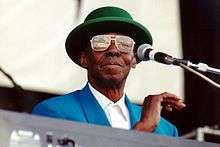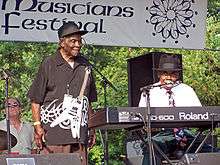Pinetop Perkins
| Pinetop Perkins | |
|---|---|
 Perkins at the Riverwalk Blues Festival in Fort Lauderdale, Florida, October 1, 2006 | |
| Background information | |
| Birth name | Joseph William Perkins |
| Born |
July 7, 1913 Belzoni, Mississippi, United States |
| Died |
March 21, 2011 (aged 97) Austin, Texas, United States |
| Genres |
Piano blues Boogie-woogie Delta blues Chicago blues |
| Occupation(s) | Pianist, singer |
| Instruments | Piano, vocals, keyboards |
| Years active | 1920s–2011 |
| Labels | Blind Pig Records |
| Website | Pinetop Perkins Foundation.org |
Joseph William Perkins (July 7, 1913 – March 21, 2011), known by the stage name Pinetop Perkins, was an American blues pianist. He played with some of the most influential blues and rock and roll performers in American history and received numerous honors during his lifetime, including a Grammy Lifetime Achievement Award and induction into the Blues Hall of Fame.
Life and career
Early career
Perkins was born in Belzoni, Mississippi.[1] He began his career as a guitarist but then injured the tendons in his left arm in a fight with a chorus girl in Helena, Arkansas.[2] Unable to play the guitar, he switched to the piano. He also switched from Robert Nighthawk's radio program on KFFA to Sonny Boy Williamson's King Biscuit Time.[3] He continued working with Nighthawk, however, accompanying him on "Jackson Town Gal" in 1950.
In the 1950s, Perkins joined Earl Hooker and began touring. He recorded "Pinetop's Boogie Woogie" (written by Pinetop Smith and originally recorded by him in 1928) at Sam Phillips's Sun Studio, in Memphis, Tennessee. ("They used to call me Pinetop," he recalled, "because I played that song.")[4]
Perkins then relocated to Illinois and left the music business until Hooker persuaded him to record again in 1968. Perkins replaced Otis Spann when Spann left the Muddy Waters band in 1969.[3] After ten years with that organization, he formed the Legendary Blues Band with Willie "Big Eyes" Smith, recording through the late 1970s, 1980s and early 1990s.[3]
Later career
Perkins played a brief musical cameo on the street outside Aretha's Soul Food Cafe in the 1980 movie The Blues Brothers, having an argument with John Lee Hooker over who wrote "Boom Boom." He also appeared in the 1987 movie Angel Heart as a member of guitarist Toots Sweet's band.
Perkins was a sideman on countless recordings but never had an album devoted solely to his artistry until the release of After Hours on Blind Pig Records in 1988.[5] The tour in support of the album featured Jimmy Rogers and guitarist Hubert Sumlin. In 1998 Perkins released the album Legends, featuring Sumlin.
Perkins was driving his automobile in 2004 in La Porte, Indiana, when his car was hit by a train. The car was wrecked, but the 91-year-old driver was not seriously hurt. Until his death, Perkins lived in Austin, Texas. He usually performed a couple of nights a week at Nuno's, on Sixth Street. In 2005, he received a Grammy Lifetime Achievement Award.
In 2008, Perkins, together with Henry Townsend, Robert Lockwood, Jr. and David "Honeyboy" Edwards, received a Grammy Award for Best Traditional Blues Album for Last of the Great Mississippi Delta Bluesmen: Live in Dallas. He was also nominated in the same category for his solo album Pinetop Perkins on the 88's: Live in Chicago.
The song "Hey Mr. Pinetop Perkins", performed by Perkins and Angela Strehli, played on the common misconception that he wrote "Pinetop's Boogie Woogie":
- Hey Mr. Pinetop Perkins
- I got a question for you
- How'd you write that first boogie woogie
- The one they named after you
Oldest Grammy winner
At the age of 97, he won a Grammy Award for Best Traditional Blues Album for Joined at the Hip, which he recorded with Willie "Big Eyes" Smith. Perkins thus became the oldest winner of a Grammy Award,[6] edging out comedian George Burns, who had won in the spoken word category 21 years earlier (Perkins, at the age of 90, had tied with Burns in 2004).[7]
A little more than a month later, on March 21, 2011, Perkins died at his home in Austin.[6] At the time of his death, he had more than 20 performances booked for 2011. Shortly before he died, while discussing his late career resurgence with an interviewer, he conceded, "I can't play piano like I used to either. I used to have bass rolling like thunder. I can't do that no more. But I ask the Lord, please forgive me for the stuff I done trying to make a nickel." He and David "Honeyboy" Edwards were the last surviving original Delta blues musicians. Perkins was also one of the last surviving bluesmen to have known Robert Johnson.[8]
Selected discography
- 1976: Boogie Woogie King (recorded 1976, released 1992)
- 1977: Hard Again (Muddy Waters)
- 1988: After Hours
- 1992: Pinetop Perkins with the Blue Ice Band
- 1992: On Top
- 1993: Portrait of a Delta Bluesman
- 1995: Live Top (with the Blue Flames)
- 1996: Eye to Eye (with Ronnie Earl, Willie "Big Eyes" Smith and Calvin "Fuzz" Jones)[9]
- 1997: Born in the Delta
- 1998: Sweet Black Angel
- 1998: Legends (with Hubert Sumlin)
- 1998: Down in Mississippi
- 1999: Live at 85! (with George Kilby Jr)
- 2000: Back on Top
- 2003: Heritage of the Blues: The Complete Hightone Sessions
- 2003: All Star Blues Jam (with Bob Margolin and others)
- 2003: 8 Hands on 88 Keys: Chicago Blues Piano Masters
- 2004: Ladies Man
- 2007: 10 Days Out: Blues from the Backroads (with Kenny Wayne Shepherd and the Muddy Waters Band, recorded live)[10]
- 2008: Pinetop Perkins and Friends
- 2010: Joined at the Hip (with Willie "Big Eyes" Smith)
- 2012: Heaven (with Willie "Big Eyes" Smith on one track and liner notes by Justin O'Brien)
Gallery

 Perkins at the Santa Cruz Blues Festival, 2008
Perkins at the Santa Cruz Blues Festival, 2008 Perkins at the Master Musicians Festival in Somerset, Kentucky, July 19, 2008
Perkins at the Master Musicians Festival in Somerset, Kentucky, July 19, 2008 David "Honeyboy" Edwards and Perkins at the Master Musicians Festival in Somerset, Kentucky
David "Honeyboy" Edwards and Perkins at the Master Musicians Festival in Somerset, Kentucky Perkins in Austin, Texas, May 19, 2008
Perkins in Austin, Texas, May 19, 2008
See also
- Blues Hall of Fame
- List of blues musicians
- List of boogie woogie musicians
- List of Chicago blues musicians
- Chicago Blues Festival
- Long Beach Blues Festival
- Kentuckiana Blues Society
References
- ↑ "Birth information". IMDb.com. Retrieved 6 January 2015.
- ↑ Dahl, Bill. "Pinetop Perkins". Allmusic. Retrieved 2014-01-26.
- 1 2 3 Russell, Tony (1997). The Blues: From Robert Johnson to Robert Cray. Dubai: Carlton Books. p. 154. ISBN 1-85868-255-X.
- ↑ Joe Willie "Pinetop" Perkins, 2000 NEA National Heritage Fellowships
- ↑ Blind Pig Records. "Blind Pig Records". Blind Pig Records. Retrieved 2011-03-22.
- 1 2 "BBC News – Blues pianist Pinetop Perkins dies aged 97". Bbc.co.uk. March 22, 2011. Retrieved 2011-03-22.
- ↑ "Blues pianist Pinetop Perkins becomes oldest Grammy winner with award for 'Joined at the Hip'". 1310 News. 2011-02-14. Retrieved 2011-04-09.
- ↑ "B.B King leads tributes to Pinetop Perkins". Telegraph.co.uk. 22 March 2011. Retrieved 6 January 2015.
- ↑ "Eye to Eye". Valley Entertainment-Sledgehammer Blues. Retrieved 8 July 2010.
- ↑ "10 Days Out: Blues from the Backroads". Yahoo Music. Retrieved 22 March 2011.
External links
- Official biography
- Pinetop Perkins at the Internet Movie Database
- Allmusic
- CD Review of Last of the Great Mississippi Delta Bluesman - Live in Dallas